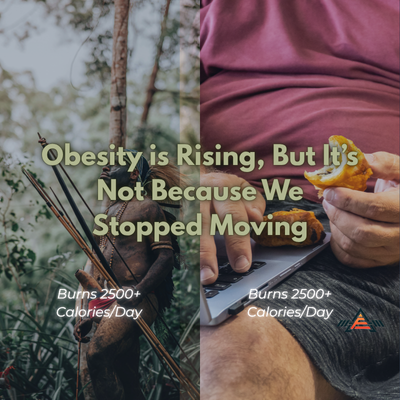Austin Phillips, Found of Ardent Fitness and Education
•
July 22, 2025
Why Obesity Is Rising in Wealthy Countries:
It's Not Because We're Moving Less
By Austin Phillips
Founder, Ardent Fitness and Education
Full study: PNAS, July 2025
The narrative is wrong. Here's what the data says.
For years, the blame for rising obesity has been placed on inactivity. The solution? Move more, sit less. But a recent study published in the Proceedings of the National Academy of Sciences challenges that narrative by comparing energy use and body composition across a wide range of human populations.
It’s the kind of research we like at Ardent: global in scope, precise in measurement, and relevant to how people live today. It doesn’t just compare people in gyms to people on couches. It looks at hunter-gatherers, farmers, pastoralists, and folks in modern cities. Over 4,000 adults were studied across 34 populations and six continents.
The takeaway: the rise in obesity has far more to do with how we eat than how we move.
What they Found
- People in developed countries burn more total energy:
This is largely due to bigger bodies, more fat-free mass means a higher baseline energy cost to stay alive. - Once adjusted for body size, energy expenditure is surprisingly stable across all groups:
Hunter-gatherers and urban professionals burn a similar number of calories per pound of lean mass. That is a big deal! It means being "sedentary" doesn't necessarily equal burning fewer calories. - Obesity is strongly linked to diet, not activity:
The real differentiator wasn't how many calories people used, but how man they took in, especially from ultra processed foods. - Ultra processed foods were linked to higher body fat percentages:
This held up even when controlling for energy expenditure and economic development. More processed food equals more stored fat.
What the study did well
- Massive sample size:
Over 4,200 individuals across 34 diverse cultures - Use of gold-standard measurement tools:
Doubly labeled water, isotope-based body composition tracking, and consistent energy models. - Clear statistical modeling:
The used regression models that adjusted for fat free mass, fat mass, age, and sex. These are not rough averages, they are refined comparisons.
This is the kind of data that can inform both public policy and coaching strategies.
What could be better
- Cross-sectional design:
This study captures a snapshot in time. It doesn't track how individuals change over months or years. - Limited dietary data:
Only 25 out of the 34 populations had information on ultra processed food intake. That is a hole in the data that matters, since food quality is a major conclusion. - No behavioral data:
We don' t know how people ate the foods they consumed. Were meals rushed, mindful, social, or emotional? That context matters when it comes to coaching clients. - Assumption of energy balance:
Most participants were "weight stable" during the study, but this was self-reported over a short window. That is not the same as metabolic balance over time.
That said, for such a large and diverse dataset, the authors did an impressive job handling limitations without overreaching their claims.
What we can apply right now
This study doesn't just tell us what is happening, it gives us direction.
Here are three things you can start doing today that align with the research:
- Cut back on ultra processed foods
These are food made in factories with ingredients you can't pronounce. Even if your calories are "on target," these foods promote fat storage, reduce satiety, and alter digestion. Swap frozen meals and snack bars for whole foods cooked at home. - Stop thinking of exercise as a calorie eraser
You can't outrun a poor diet. Movement matters for your heart, your mood, and your confidence. It is not your primary fat loss tool. Let exercise be a foundation, not a punishment. - Build structure into your eating
Most people in this study who ate well didn't do it through discipline. They did it through culture. At Ardent, we build meal structure into our nutrition coaching. You don't need to white-knuckle every meal. You need a plan that makes eat well feel automatic.
What this means for the Ardent community
This study backs up what we already believe. Nutrition matters. Structure matters. And your body isn't broken; it’s just responding to a food environment it was never designed for.
You don’t need more willpower. You need a system that works with your biology, not against it.
Our job at Ardent isn’t to shout about discipline. It’s to help you build a life where success is the natural result of your environment, habits, and support.
If you're ready to start that shift, book a No-Sweat Intro and we’ll help you get started.

